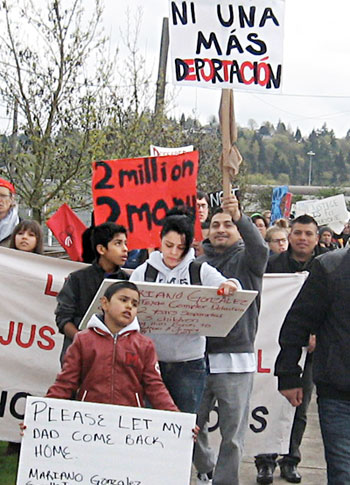

Vol. 78/No. 16 April 28, 2014

|
| Militant/Jeanne FitzMaurice |
| Protest outside Tacoma, Wash., immigration jail April 5 demands “not one more deportation.” |
The prison is privately owned by GEO Group, Inc., on behalf of the Department of Homeland Security and has beds for approximately 1,500.
A hunger strike that started March 7 and initially involved some 750 inmates resumed March 24. More than 20 hunger strikers were put into solitary confinement that day. About 70 were still on hunger strike as of April 5, Sandy Restrepo, an attorney with the People’s Legal Collective who represents detainees at the immigration jail, told the Militant at the protest.
The American Civil Liberties Union and Columbia Legal Services filed a lawsuit against the use of solitary confinement against a hunger strike. But the ACLU announced it was withdrawing the suit after a number were released from solitary.
Maru Villalpando of Latino Advocacy told the Militant that five still remain in solitary. “Four of them are being charged with inciting a group demonstration and a fifth with inciting a work stoppage,” she said. “Those in solitary are in the hole for 23 hours per day, shower three times a week, have no reading material, no phone calls and are not allowed legal representation.”
Addressing the rally Villalpando said, “We demand an immediate end to solitary confinement and that President Obama end deportations and enact deferred action for all immigrant workers.”
“I spent 16 days in this prison several years ago,” Pepe Colmentres, a member of El Comite, told the Militant. “The food is bad and inadequate. We had to take leftovers from garbage cans just to get enough to eat.” El Comite is also part of the May 1 Acton Coalition, which is sponsoring a May 1 demonstration in Seattle.
“My husband was deported and tried to come back into the country so he could see his children,” said Juliana Gonzalez, who works in a factory in Seattle and was at the rally with her two children. “He is now in a detention center in South Texas and his children haven’t seen their father in two and a half years.”
At the rally messages were read to the demonstrators. José Moreno, who participated in the first hunger strike and is now out on bond pending an appeal, explained how they organized the action. “Even though people were afraid, we felt that with all the support outside we could send a message about the conditions we faced.”
“Through notes surreptitiously passed in hallways, word of a hunger strike spread among the segregated pods where groups of detainees are kept,” wrote the Seattle Weekly, citing an interview from Moreno. “On the evening of Friday, March 7, they made their move: 750 meal trays were returned.”
Angelica Chazaro, a professor at the University of Washington, told rally participants how the second hunger strike is being organized. “Each day a different pod refuses food so that no one person puts themselves into any medical jeopardy,” she said.
The April 5 protest was part of a national day of actions demanding the Obama administration end deportations. In Washington, demonstrations were organized at immigration detention centers in Sumas, Forks and Yakima.
Front page (for this issue) |
Home |
Text-version home